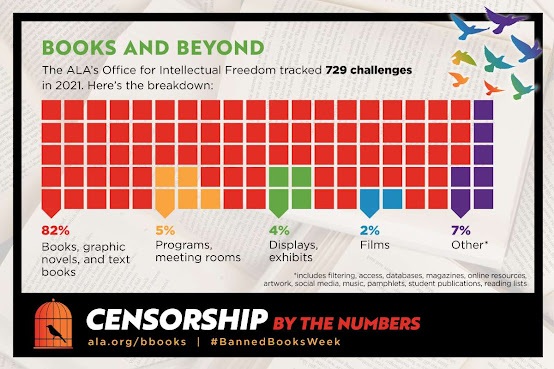- Deborah Caldwell-Stone, director of the ALA’s Office for Intellectual Freedom
In a time of intense political polarization, library staff in every state are facing an unprecedented number of attempts to ban books. ALA’s Office for Intellectual Freedom tracked 729 challenges to library, school and university materials and services in 2021, resulting in more than 1,597 individual book challenges or removals. Most targeted books were by or about Black or LGBTQIA+ persons.
The theme for Banned Books Week 2022 is "Books Unite Us. Censorship Divides Us." Sharing stories important to us means sharing a part of ourselves. Books reach across boundaries and build connections between readers. Censorship, on the other hand, creates barriers. Banned Books Week is both a reminder of the unifying power of stories and the divisiveness of censorship, and a call to action for readers across the country to push back against censorship attempts in their communities.
About Book Bans and ChallengesBooks are still being banned and challenged today. A challenge is an attempt to remove or restrict materials, based upon the objections of a person or group. A banning is the removal of those materials.
While books have been and continue to be banned, part of the Banned Books Week celebration is the fact that, in a majority of cases, the books have remained available. This happens only thanks to the efforts of librarians, teachers, students, and community members who stand up and speak out for the freedom to read.
- Gender Queer by Maia Kobabe
Reasons: Banned, challenged, and restricted for LGBTQIA+ content, and because it was considered to have sexually explicit images - Lawn Boy by Jonathan Evison
Reasons: Banned and challenged for LGBTQIA+ content and because it was considered to be sexually explicit - All Boys Aren’t Blue by George M. Johnson
Reasons: Banned and challenged for LGBTQIA+ content, profanity, and because it was considered to be sexually explicit - Out of Darkness by Ashley Hope Perez
Reasons: Banned, challenged, and restricted for depictions of abuse and because it was considered to be sexually explicit - The Hate U Give by Angie Thomas
Reasons: Banned and challenged for profanity, violence, and because it was thought to promote an anti-police message and indoctrination of a social agenda - The Absolutely True Diary of a Part-Time Indian by Sherman Alexie
Reasons: Banned and challenged for profanity, sexual references and use of a derogatory term - Me and Earl and the Dying Girl by Jesse Andrews
Reasons: Banned and challenged because it was considered sexually explicit and degrading to women - The Bluest Eye by Toni Morrison
Reasons: Banned and challenged because it depicts child sexual abuse and was considered sexually explicit - This Book is Gay by Juno Dawson
Reasons: Banned, challenged, relocated, and restricted for providing sexual education and LGBTQIA+ content. - Beyond Magenta by Susan Kuklin
Reasons: Banned and challenged for LGBTQIA+ content and because it was considered to be sexually explicit.
Banned by a Florida elementary school in 1993 because it "promotes disrespect, horror, and violence".
Questioned because author Shel Silverstein's career included having drawn cartoons for Playboy, leading some to claim that the book contained "suggestive illustrations."
Challenged or banned dozens of times; challenges continue to this day.
Ranked fifth of the top 100 banned or challenged books in America between 2000 and 2009.




No comments:
Post a Comment
Thank you for visiting and taking the time to comment. It means so much.
I apologize for word verification, but as soon as I changed the settings from only users with Google accounts, I started receiving a ton of spam comments...within one hour of changing the settings. The bots are on high alert apparently.